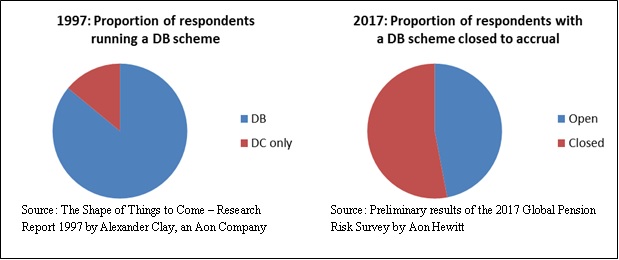How has DB changed in 20 years?
From the blog: April 2017 saw the 20th anniversary of the introduction of scheme actuaries. I don't expect there were many parties in celebration, but it made me think about how scheme actuaries, and defined benefit pensions, have changed over 20 years and what might happen next.
My first port of call was to dig out some statistics from client surveys which bookend the period:
In 1997, 86 per cent of respondents ran a DB scheme. By 2017, over half of respondents had frozen their DB schemes – underlining how the role of scheme actuaries (and trustees) is shifting towards schemes in run-off.
But April 1997 was not just about scheme actuaries – the Minimum Funding Requirement, the Occupational Pensions Regulatory Authority and section 67 were all brought in with the implementation of the Pensions Act 1995.
MFR, of course, was replaced in 2005 by the Scheme Specific Funding, and I don’t think anyone mourned its passing. SSF has fared better – largely working as intended.
What is interesting is the progression this has led to for scheme actuaries. Pre-1997, actuaries often just determined the contribution rate themselves; under MFR they calculated the minimum rate – which tended to become the final rate too. Under the SSF, they advise the trustees on assumptions and contributions – and it is the trustees who decide. Quite a change.
Things have moved on
Opra was replaced in 2005 by the Pensions Regulator and, just like funding standards, ‘version 2.0’ has also been much more successful, bringing a move away from checklist compliance towards principles and judgment.
Section 67 is still with us. Ok, the detail underlying it has changed over 20 years, but the basic principle that leaving service benefits cannot be reduced still applies. Or does it?
The DWP's green paper on DB pensions calls into question whether accrued pensions should remain sacrosanct or whether there should be other circumstances than PPF entry when they can be ‘compromised’ – the current euphemism for reduced.
In fact, the green paper questions the role of the regulator and funding standards too.
History is repeating itself. The Pensions Act 1995 was brought in as ’the answer’ to the Maxwell pensions scandal, but things have moved on. Should ’the answer’ be updated?
Some argue for wholesale change, but my view is that the framework laid down 20 years ago remains generally fit for purpose, and many seem to agree. Now is the time to express your views.
Matthew Arends is a partner in consultancy firm Aon Hewitt


